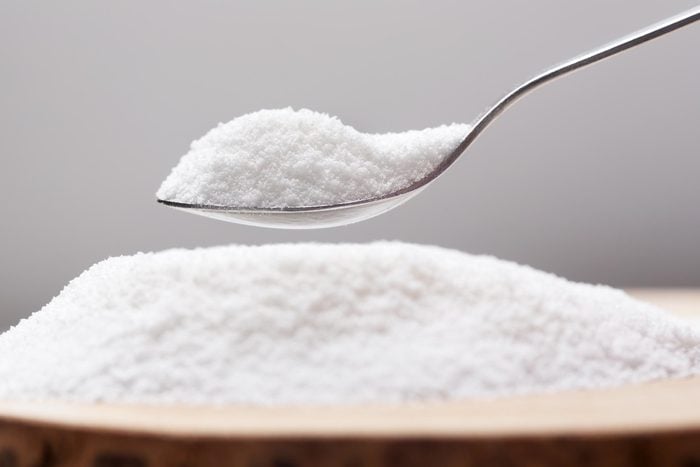This Artificial Sweetener Can Permanently Damage Your DNA, New Study Says
Updated: Sep. 26, 2023

It often comes in a certain-colored little packet, and now growing evidence suggests its impact on your body isn't so sweet.
If you’re proud of the strides you’ve made to reduce the amount of sugar you consume, major kudos—healthier habits take intention and discipline. However, that sugar substitute may not be great for you and may not even help stave off weight gain. In fact, a new toxicology study found that one popular low-calorie sweetener may have a major impact on your biology.
A May 2023 North Carolina State University and University of North Carolina at Chapel Hill study published in the Journal of Toxicology and Environmental Health, Part B revealed that digesting sucralose can lead to a “genotoxic” effect. Genotoxic is a term signifying that it disrupts DNA structure. This compound isn’t just a byproduct—it’s also present in minute quantities of the sweetener.
These findings shine a light on the pressing question: Could our sweeteners be contributing to health issues?
This Natural Sweetener May Lower Cholesterol and Blood Sugar, New Study Says
What is sucralose-6-acetate?
Splenda is one brand name for sucralose, while some generic sucralose brands also come in yellow-colored packaging that’s typically meant to call Splenda to mind.
The chemical in question in these products is sucralose-6-acetate, a fat-soluble compound that’s produced in the gut after sucralose is ingested. Previous work by the same research team established that several such compounds are made in the gut, but the discovery of sucralose-6-acetate stands out.
Susan Schiffman, PhD, a study author and adjunct professor in the joint department of biomedical engineering at NC State University and UNC at Chapel Hill, says in a press release: “Our new work establishes that sucralose-6-acetate is genotoxic. We also found that trace amounts of sucralose-6-acetate can be found in off-the-shelf sucralose, even before it is consumed and metabolized.”
This Zero-Calorie Sweetener Was Just Linked to Heart Attack and Stroke
The unseen dangers of the sweetener
The implications of this discovery are not to be taken lightly. The European Food Safety Authority has a threshold of toxicological concern for all genotoxic substances of 0.15 micrograms per person daily.
Dr. Schiffman warned, “Our work suggests that the trace amounts of sucralose-6-acetate in a single, daily sucralose-sweetened drink exceed that threshold. And that’s not even accounting for the amount of sucralose-6-acetate produced as metabolites after people consume sucralose.”
This is supported by the in vitro experiments the researchers conducted, exposing human blood cells to sucralose-6-acetate and monitoring for markers of genotoxicity. Schiffman said, “In short, we found that sucralose-6-acetate is genotoxic and that it effectively broke up DNA in cells that were exposed to the chemical.”
One possible impact of sucralose on human health
Apart from the genotoxicity, Schiffman’s team explored how sucralose-6-acetate affects gut health. Notably, they found that both sucralose and sucralose-6-acetate can cause a “leaky gut,” a condition that can lead to harmful substances being absorbed into the bloodstream. The genetic activity of the gut cells also changed in response to sucralose-6-acetate, showing increased activity in genes related to oxidative stress, inflammation, and carcinogenicity.
WHO Advises Against Using Non-Sugar Sweeteners for Weight Control
The bottom line
The mounting evidence against sucralose and its metabolites raises many concerns about the potential health effects associated with these substances. Dr. Schiffman says, “It’s time to revisit the safety and regulatory status of sucralose, because the evidence is mounting that it carries significant risks.” It’s not just about counting calories but also about understanding what you put into your body. Dr. Schiffman’s advice? “If nothing else, I encourage people to avoid products containing sucralose. It’s something you should not be eating.”
The World Health Organization (WHO) recently cautioned against the use of non-sugar sweeteners (NSS), a category that includes artificial sweeteners such as sucralose, as well as aspartame, saccharin, and stevia. This advice was based on a thorough review of existing research, which indicates that these artificial sweeteners do not contribute to weight management or reduce the risk of weight-related health conditions. The WHO says its guidance applies to everyone, with the exception of individuals with pre-existing diabetes, and encompasses all synthetic, naturally occurring, or modified non-nutritive sweeteners.
Francesco Branca, MD, PhD, WHO Director for Nutrition and Food Safety, explained in a news release: “Replacing free sugars with [non-sugar sweeteners] does not help with weight control in the long term. People need to consider other ways to reduce free sugars intake, such as consuming food with naturally occurring sugars, like fruit, or unsweetened food and beverages. NSS are not essential dietary factors and have no nutritional value. People should reduce the sweetness of the diet altogether, starting early in life, to improve their health.”
However, the WHO’s recommendation has been “assessed as conditional,” indicating that policy decisions based on this guideline may require significant discussion, depending on specific contexts, such as the extent of consumption in different age groups and varies by country.
In the face of these revelations, we must stay informed and make mindful choices about our consumption habits. Remember, it’s not just about counting calories but also about understanding what you’re putting into your body.
For the latest in health and wellness, get The Healthy @Reader’s Digest newsletter. Keep reading for more expert advice:
